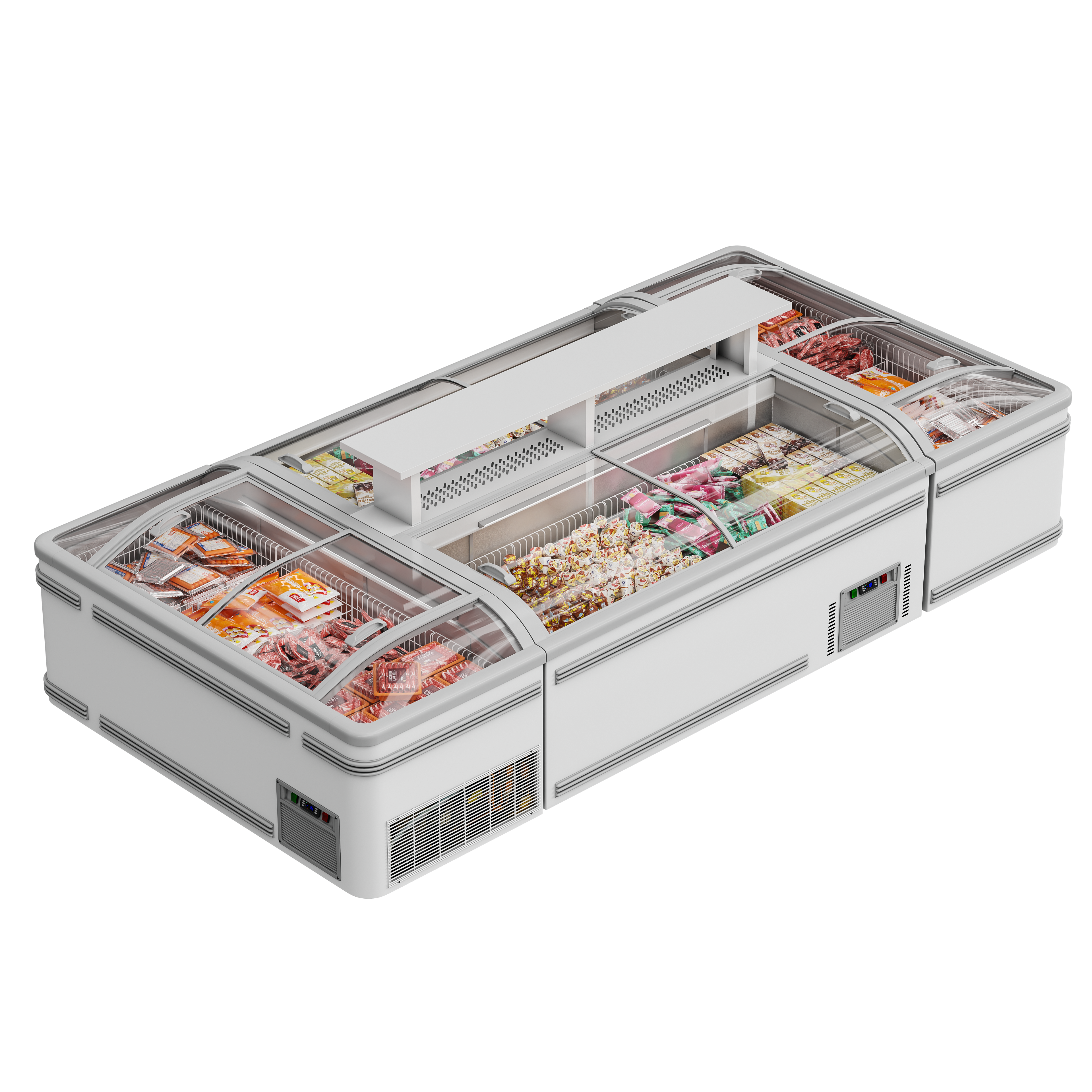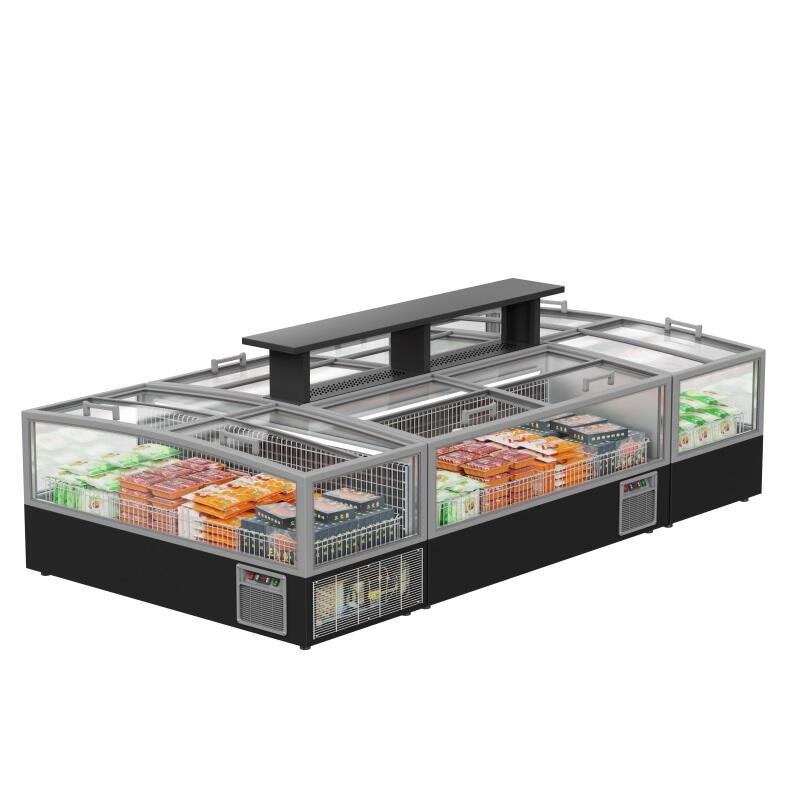Island Freezer Design Features and Market Demand
Key Design Features of Modern Island Freezers
Energy-Efficient Cooling Systems
Modern island freezers are equipped with cutting-edge cooling systems, such as the use of hydrocarbon refrigerants, which significantly reduce energy consumption. This results in lower operational costs and energy bills for businesses. Additionally, the incorporation of variable-speed compressors allows freezers to adjust their cooling output based on consumer demand, optimizing energy efficiency. According to the Department of Energy, upgrading to energy-efficient commercial freezers can lead to a reduction in energy costs by up to 30% compared to older models. This not only supports sustainability goals but also contributes to cost-effectiveness in retail operations.
Durable Materials & Sliding Glass Doors
Island freezers are constructed with high-quality materials such as stainless steel and tempered glass to ensure durability and an attractive aesthetic that enhances product display. Stainless steel is resistant to corrosion, making it ideal for long-term use, while tempered glass provides transparency and strength. The inclusion of sliding glass doors in these designs enhances accessibility to products while reducing the escape of cold air, which helps to maintain optimal temperature levels. Research shows that sliding glass door models can cut energy loss by 30% compared to models with solid doors, reflecting their efficiency in retail environments.
Temperature Control & Auto-Defrost Technology
Advanced temperature control systems in modern island freezers provide users with options like digital displays and programmable settings, ensuring precise management of temperature suitable for a wide variety of frozen goods. Such precision contributes to the preservation of food quality and extends storage time. Additionally, auto-defrost technology integrated into these freezers prevents the buildup of ice, which otherwise would require manual intervention for removal. As a result, businesses can save significant time and maintenance costs. Industry studies have highlighted that improved temperature control mechanisms can significantly prolong the shelf life of frozen foods by maintaining their quality.
Space Optimization & Modular Configurations
The design of island freezers focuses on maximizing space efficiency through features like modular configurations, allowing for a customizable setup that suits different store layouts. This flexibility is beneficial for retailers looking to optimize their display and storage space, accommodating a variety of product assortments as per seasonal demand changes. Additionally, features such as adjustable shelving and multi-tiered arrangements aid in adapting inventory displays effectively. Current market trends indicate a growing preference among retailers for space-efficient solutions, which enhance stocking capacity and potentially boost sales by showcasing a wider range of products without requiring additional floor space.
Market Demand Drivers for Commercial Island Freezers
Growth in Frozen Food Retail & Hospitality Sectors
The rise in frozen food products in grocery stores and restaurants is driving a significant demand for island freezers. Research indicates a compound annual growth rate (CAGR) of 5.6% in the global frozen food market, highlighting the need for effective storage solutions. As consumer preferences shift towards convenience and products with longer shelf-life, island freezers become vital for businesses in the retail and hospitality sectors. Their ability to maintain optimal temperatures makes them ideal for preserving the quality of frozen foods, catering to the evolving consumer demand.
Urbanization and Space-Efficient Storage Needs
Rapid urbanization has resulted in smaller retail spaces, making space-efficient solutions like island freezers essential for businesses, especially in densely populated areas. The increasing demand for compact designs is driving innovation in island freezer designs. With urban populations projected to rise by 66% by 2050, the need for efficient refrigeration solutions is more critical than ever. These freezers help maximize storage capacity without consuming excessive floor space, turning limited real estate into a strategic advantage for retailers.
Sustainability Trends in Refrigeration
There is a noticeable shift toward environmentally friendly products, significantly impacting the island freezers market. The adoption of energy-efficient models and eco-friendly refrigerants aligns with broader sustainability trends. According to industry reports, companies embracing sustainable practices, such as eco-friendly refrigeration, are experiencing increased customer loyalty and sales. As environmental consciousness rises, businesses are finding that investing in sustainable island freezer technology not only meets regulatory standards but also attracts green-minded consumers.
Top Island Freezer Models for Commercial Use
Island Freezer A White: High-Capacity Direct Cooling
The Island Freezer A White boasts a high-capacity design, tailored for businesses with extensive inventory needs. Its direct cooling technology ensures rapid temperature recovery, which is critical for maintaining product freshness and safety. With a storage capacity of up to 20 cubic feet, this model is ideal for bustling retail environments where efficiency and reliability are paramount.
H-Series Freezers: Digital Temperature Controllers
The H-Series Freezers are equipped with advanced digital temperature control systems, which facilitate precise temperature management crucial for maintaining product quality. Additionally, these models include alarms to detect temperature fluctuations, ensuring adherence to health regulations and safeguarding product integrity. With digital controllers becoming a staple in the market, these freezers enhance usability and reliability for operators in diverse commercial settings.
Combination H-Series: Flexible Multi-Zone Storage
The Combination H-Series freezer offers flexible multi-zone storage solutions, allowing users to segregate products for optimal temperature settings. Its customizable compartments cater to diverse inventory needs, making it an adaptable choice for varied retail environments. User reviews highlight the practicality of this feature, significantly aiding businesses in effectively managing a variety of frozen food categories, thereby optimizing operational efficiency.
Regional Trends in Island Freezer Adoption
North America: Dominance in Smart Freezer Integration
North America is at the forefront of integrating smart technology into island freezers, significantly boosting operational efficiency and user-friendliness. Modern features such as remote monitoring and automated alerts enable businesses to maintain optimal storage conditions effortlessly, thereby minimizing food waste. Reports suggest that the North American market for smart appliances, including refrigeration systems, is projected to soar by 15% over the next five years, indicating robust growth and continued innovation in the sector.
Asia-Pacific: Rapid Growth in Retail Infrastructure
The Asia-Pacific region is experiencing unparalleled growth in retail infrastructure, which has led to a heightened demand for island freezers. The expansion of supermarkets and convenience stores is driving the need for effective frozen food storage solutions, which are pivotal in supporting this growth. Industry analysts forecast that the Asia-Pacific frozen food market will surpass $70 billion by 2025, underscoring the critical role of island freezers in accommodating the burgeoning retail landscape.
Europe: Eco-Friendly Refrigerant Regulations
Europe has implemented rigorous regulations on refrigerants to foster a shift toward eco-friendly options in island freezers. This regulatory landscape is pushing manufacturers to innovate and develop refrigeration solutions that comply with sustainability standards. Market insights project that eco-friendly refrigerants will witness a compound annual growth rate of 7% in the European market through 2030, highlighting the increasing importance of sustainability within the industry.

 EN
EN
 AR
AR
 BG
BG
 HR
HR
 CS
CS
 DA
DA
 NL
NL
 FI
FI
 FR
FR
 DE
DE
 EL
EL
 HI
HI
 IT
IT
 JA
JA
 KO
KO
 NO
NO
 PL
PL
 PT
PT
 RO
RO
 RU
RU
 ES
ES
 SV
SV
 TL
TL
 ID
ID
 LT
LT
 SR
SR
 SK
SK
 SL
SL
 UK
UK
 VI
VI
 HU
HU
 TH
TH
 TR
TR
 AF
AF
 MS
MS
 GA
GA
 AZ
AZ
 KK
KK
 SI
SI
 UZ
UZ



